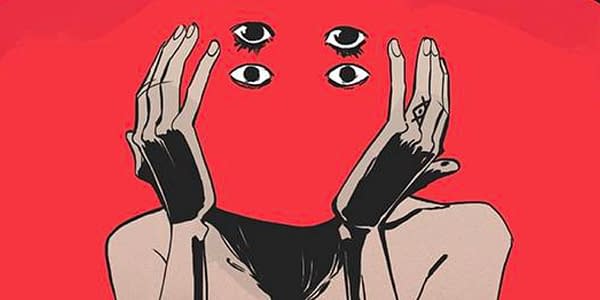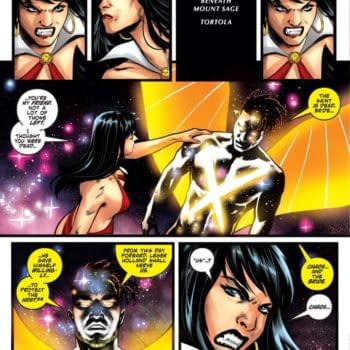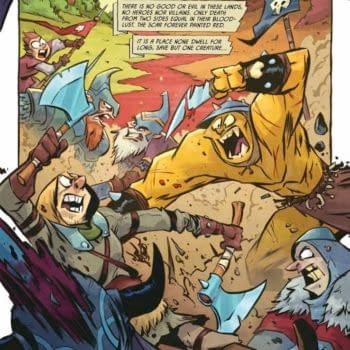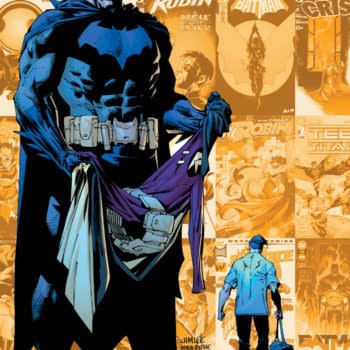Posted in: Comic Pros, Comics | Tagged: aftershock, interview, Jen Hickman, lonely receiver, Zac Thompson
Bloody Heartbreak: Zac Thompson Talks Lonely Receiver #3
Following the release of each issue of Aftershock's Lonely Receiver by writer Zac Thompson and artist Jen Hickman, Bleeding Cool will host conversations with Thompson about this sci-fi breakup story turned psychological horror. This time, Zac Thompson talks about heartbreak, drugs, and murder.

Theo Dwyer: In this issue, I can feel you and Jen digging in deeper. There are certain visual elements here, and even aspects of the whole plot of Lonely Receiver, that seem surrealist in nature. In a book like this, with future technology blending with relationships in surprising ways, the question that comes up when reading Lonely Receiver is, "How much of what I'm reading is actually happening?" There are elements that can be seen as symbolic, others that could be totally in Catrin's grief-shattered mind — but then, I can't help but wonder if it's all just real. Do you and Jen Hickman have those conversations where you discuss what is surrealism and what is really happening in the narrative?
Zac Thompson: It's all in the script. Which is to say, part of constructing a story like this is making clear lines about how the dream logic of it all is working. I made sure that we clearly laid out when Catrin was lying to herself or where we were skirting off into surreal. And then there are surrealism elements that are actually happening. The entire goal of the book, and part of the progression of the issues, is for each element of the story to inform what came before. Adding more context, resolving some questions, but creating a few new ones in the process. I've often likened it to the unfurling of a flower. Jen was also instrumental in constructing a visual language for surreal moments and ensuring there was a visual progression as the surreal stuff comes more and more into play. But I like to think of it as a Lynch movie, I guess. There's a rolling dream logic to it all, very much by design.
Theo Dwyer: The casual use of hard drugs stood out to me in Lonely Receiver #3. What I was wondering is if that part of the story is a result of society loosening up its ideas about drug use in your vision of the future, or is that part of Catrin's downward spiral?
Zac Thompson: Little bit of column A and a little bit of column B. Most of it was to communicate Catrin's lack of regard for her own well-being. To show that she's actively in this escape phase where she'd rather be fucked up than dealing with her personal problems. Which, I think, is part of any rebound phase after a giant breakup. But yeah, I think there's going to be a collective backtrack about drug use in the next decade or two. It's already happening in Canada. Cannabis is legal, magic mushrooms are decriminalized, and in my city, just passed a motion to decriminalize all drugs. It's far too long an answer to unpack here, but most of what we consider "hard drugs" are very similar to prescription drugs. And in many ways, certain drugs (like cannabis) can actually solve many of the same problems that are often solved with more dangerous, more addictive, more expensive alternatives made by giant pharmaceutical companies.
Theo Dwyer: When writing a heavy issue like this issue of Lonely Receiver, what does your writing process look like? Kerouac mad dash of emotion, or breaking it down piece by piece, somewhere in-between? Writing something personal, I know, can take a good deal of emotional energy.
Zac Thompson: A lot of Lonely Receiver was written in fits and bursts. But I break everything down into a pretty thorough outline before committing a single idea to the script. So I usually spend a whole week just thinking about visual elements, things that need to happen, poking holes in everything. When that's all finished, I sit down with a script and start writing in a sprint. Getting about 3 or 4 pages done a day. Writing every day of the week until I finish. Most of the emotion of it all is brought in that fitful outline stage where I just generate ideas and don't commit to anything. So sometimes outlines for the series were these clean two page documents breaking down the visual composition of the page. Then like 20 insane pages filled with random lines of dialogue drawn from life and elsewhere or ideas for shots that were cool but didn't have a clean home yet. And in scripting, I just sort of hack at it until I put that puzzle together. It's a weird method, but I've found it works quite well. Aside from all that, the very formal structure of the book's timeline really helped put things into place. For the month issue, I knew I had to show Catrin and Hazel's relationship progress over thirty days. So it gave the issue an internal rhythm and forward momentum.













